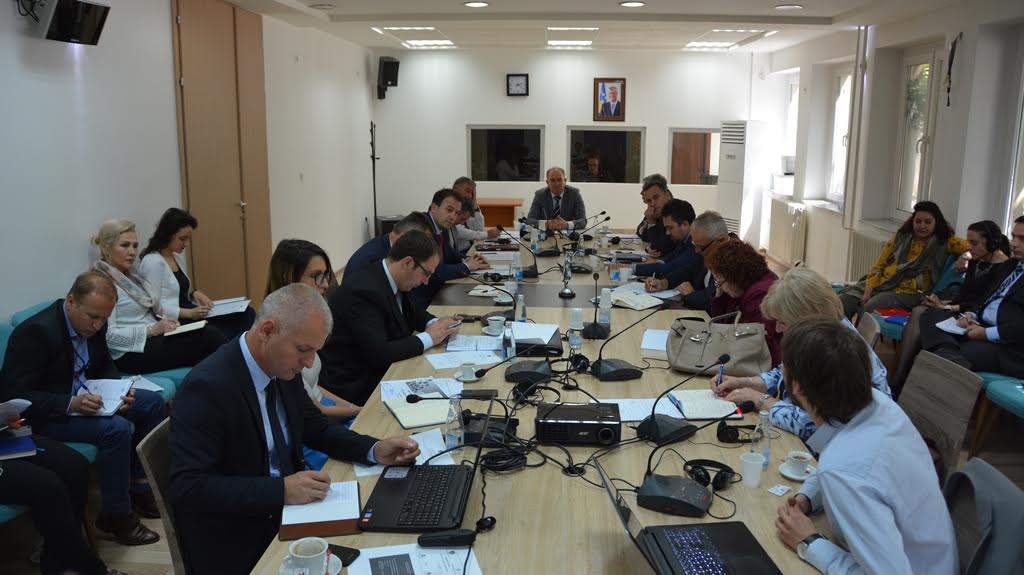FOL presents the concrete steps that would impact enhancing the transparency in the judicial system
Prishtina, 29 May 2017 – Lëvizja FOL was part of the regular monthly meeting of the Presidents of the Basic Courts and the Kosovo Judicial Council where it presented some of the concrete steps that would affect the increase of transparency in the judicial system, and consequently the increase of citizen trust.
The first point that was discussed at this meeting was the cancellation of hearings and the publication of the reasons for not keeping them. Gersi Gashi, from FOL Movement, said “While the courts in most cases do not have fault of not holding and postponing hearings, public perception is not such.
One factor that plays a role in this perception is the lack of disclosure of reasons for non-attendance of hearings. Chairperson of the Kosovo Judicial Council, Nehat Idrizi, said that this would be an important step in boosting citizens’ trust, and while there is a lack of resources to achieve this for all subjects, some of them can be started, such as cases in which the media and public interest in general is higher. Stephanie Lefeuvre, from the European Commission, stressed that the cancellation of hearings, the reason for their cancellation, would be part of the CEPEJ Indicators and the Electronic Case Management System, therefore it should be started on time.
The second point of the discussion was the anonymisation and publication of all judgments, including judgments that are not final and executable. Gersi Gashi emphasized the legal basis that allows this, since the international conventions, the Constitution of the Republic of Kosovo but also the practices of the European Court of Human Rights. While there were no objections from any of the attendees about this, the Presidents of the Basic Court of Prizren and Peja stated that such a thing should happen. The President of the Basic Court in Prizren, Ymer Hoxha emphasized that Article 22 of the Constitution of the Republic of Kosovo is a source of right in our country, and therefore it is foreseen direct implementation of international agreements / conventions, therefore publication of all judgments should be implemented. The KJC Chair added that while the law on the court prohibits the publication of all verdicts, the law should first be amended and then other changes are to be proceeded.
Regarding the issue of anonymity, while there were no objections about the non-anonymity of cases there were allegations by some mayors that such a thing should be reviewed. Such a revision is supported by FOL Movement, and proposes to have meetings between the KJC, the Presidents and the Personal Data Protection Agency, to draft a regulation which at the same time protects personal data, but also does not protect more than it needs. Moreover, the President of the Basic Court in Prizren and that of the Basic Court in Ferizaj supported the idea of publishing the judgments without anonymity at all, since according to them, when the verdict is public and issued on behalf of the people, then also as such should be published.
Finally, the issue of meetings between court presidents and oversight judges was discussed. Gersi Gashi emphasized that these meetings are very important, just as for the courts, but also for the public. While these meetings are regulated by law, at a minimum of one to three months, there should be greater transparency for these meetings, keeping and publishing the minutes of these meetings. The Presidents of the Courts indicated that these meetings are held, and more regular meetings are held and are all the time in coordination with the branches, but the minutes of these are sent to the KJC and it remains for them to decide on their publication.
As a conclusion it is important that the judiciary is making the link of transparency, accountability, and is interested in working on raising citizens’ trust. It remains to monitor these processes and postpone the implementation of discussions from this meeting.
The “Search for Justice” program aims to strengthen citizens’ demands for justice in Kosovo. This program is implemented by NCSC and is supported by the US Department of State / INL.
